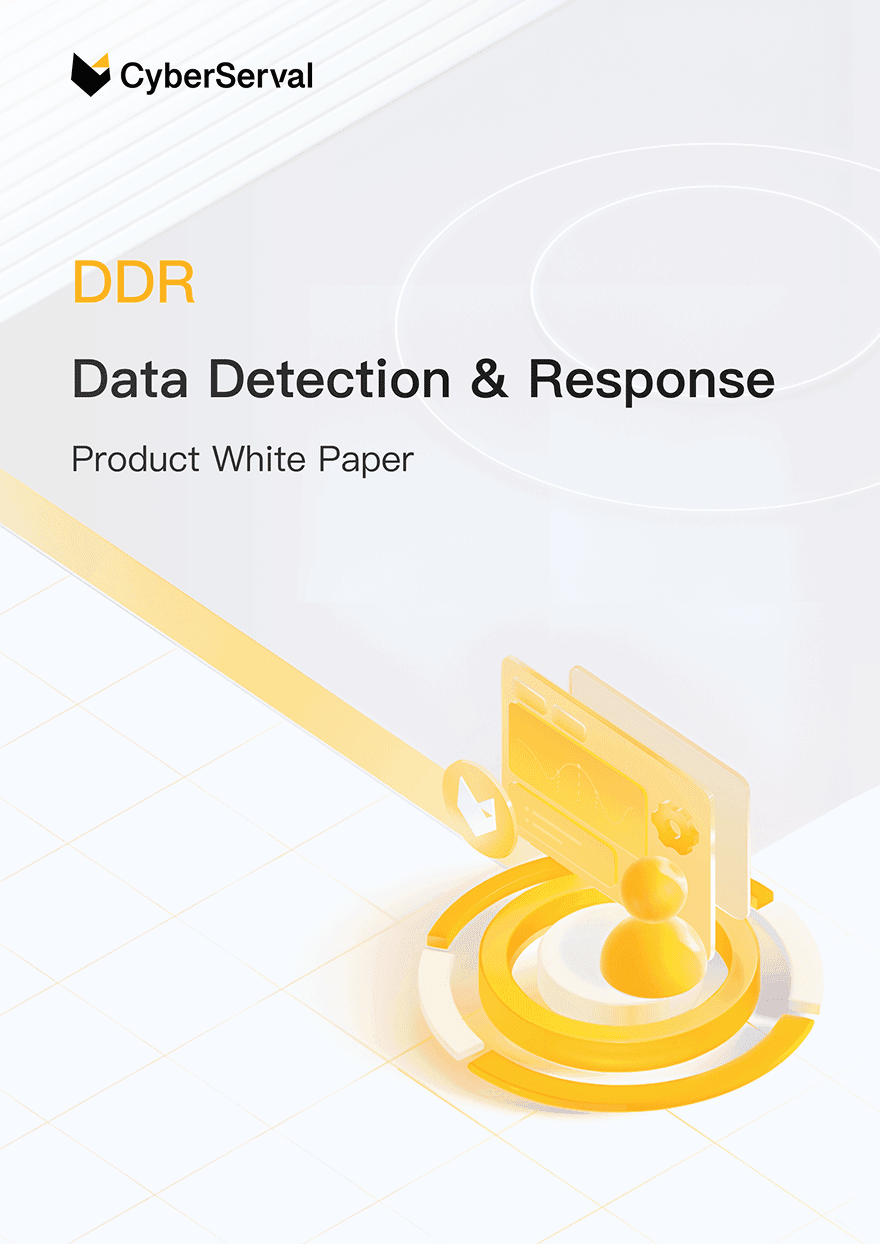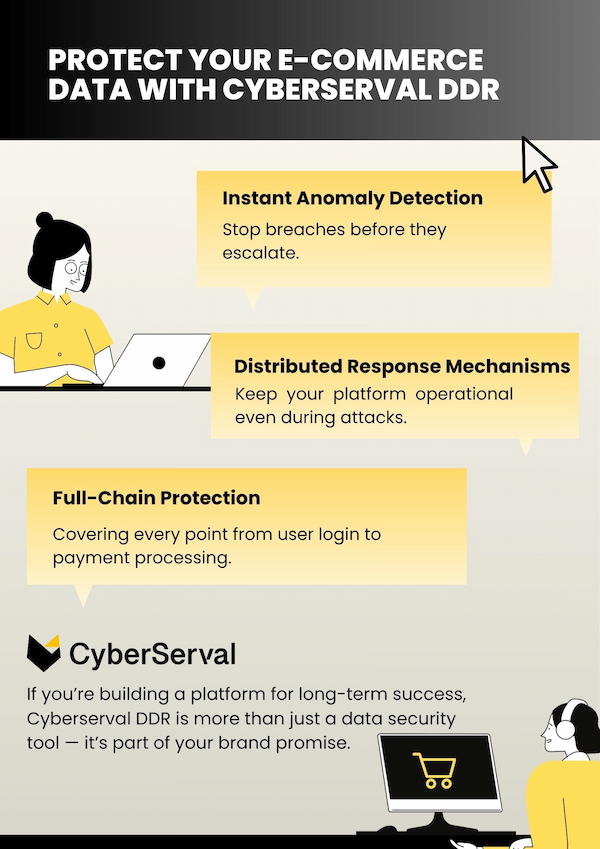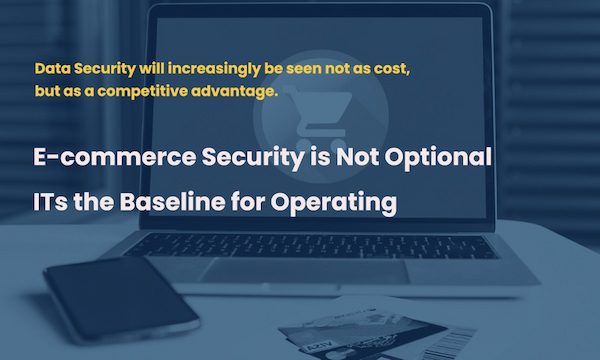 What is E-commerce Data Security and Why It Matters?
What is E-commerce Data Security and Why It Matters? Why E-commerce Data Security is Important for Long-Term Success
Why E-commerce Data Security is Important for Long-Term Success Common Types of E-commerce Data Security Threats
Common Types of E-commerce Data Security Threats E-commerce Data Security Best Practices
E-commerce Data Security Best Practices Why Cyberserval DDR Is the Smart Choice
Why Cyberserval DDR Is the Smart Choice What Does the Future of E-commerce Data Security Look Like?
What Does the Future of E-commerce Data Security Look Like?

Protecting E-Commerce Data: Key Risks, Challenges, and Next-Gen Solutions
What is E-commerce Data Security and Why It Matters?
E-commerce is now the beating heart of global retail. Every click, every purchase, every cart abandoned halfway contains valuable data. But with convenience comes risk — and in today’s hyperconnected world, cyber attack in e commerce incidents have reached an all-time high. E-commerce platforms also use big data to analyze consumers' shopping behavior to provide personalized recommendations and marketing. However, these trends also bring new data security challenges. E-commerce platforms need to handle a large amount of customers' personal and payment information. Once this data is leaked, it will cause serious damage to customer trust and brand reputation.
When attackers breach your systems, three categories of data are usually at stake:
- Customer Personal Data – phone numbers, addresses, national ID numbers.
- Product Data – product categories, pricing, purchase history.
- Code Files – proprietary platform or payment gateway source code.
If this data falls into the wrong hands, the consequences can be catastrophic:
- Personal information sold on the dark web → credit card fraud, identity theft.
- Competitors obtaining product data → pricing wars, lost market share.
- Code compromised → site downtime, halted transactions, lost customer trust.
.jpg)
Why E-commerce Data Security is Important for Long-Term Success
Recently, the computer system of Hong Kong Technology Venture Company Limited (HKTVmall) was accessed without authorization, resulting in the leakage of personal information of some registered customers. In addition, luxury brands Louis Vuitton and Dior have also experienced customer data leakage incidents, affecting hundreds of thousands of customers in Hong Kong. These incidents indicate that there are shortcomings in the e-commerce industry in protecting customers' personal and payment information. Hackers may attack e-commerce websites through phishing emails, SQL injection and other means to steal customer data. Therefore, e-commerce platforms need a data security solution that can effectively prevent data leakage and ensure transaction security.
Most see network security in e commerce as an expense. In reality, it’s an investment with measurable ROI:
Higher Conversion Rates – Customers feel safer completing purchases on a secure platform.
Increased Repeat Purchases – Trust built through safe transactions drives loyalty.
Reduced Legal & Financial Risks – Avoid lawsuits, regulatory fines, and operational downtime.
A solid ecommerce data security system doesn’t just protect you from bad actors — it signals to customers that you are trustworthy. In the competitive online marketplace, trust is often the deciding factor in a sale.
Common Types of E-commerce Data Security Threats
- Phishing & Social Engineering – Tricking users into revealing credentials.
- SQL Injection & XSS Attacks – Compromising databases and web applications.
- DDoS Attacks – Overwhelming servers, stopping sales.
- Malware & Ransomware – Locking systems until ransom is paid.
- Insider Threats – Employees or partners misusing access privileges.
E-commerce Data Security Best Practices
- SSL/TLS Encryption – Encrypt all customer data in transit.
- Two-Factor Authentication (2FA) – Add a second layer of login security.
- Regular Security Audits & Penetration Testing – Identify vulnerabilities before attackers do.
- Data Backup & Disaster Recovery Plans – Ensure quick recovery from breaches or downtime.
- Ecommerce Data Security Tools – Use Web Application Firewalls (WAF), Intrusion Detection Systems (IDS), and Data Loss Prevention (DLP) tools.
Why Cyberserval DDR Is the Smart Choice
Compared with traditional DLP, CyberServal DDR demonstrates higher efficiency and usability in the e-commerce scenario. Traditional DLP usually struggles to handle the high-concurrency and high-dynamics business characteristics of e-commerce platforms. In contrast, CyberServal DDR adopts AI-driven intelligent analysis, which can automatically learn and adapt to the business logic of e-commerce platforms, thus more accurately identifying and preventing data leakage. For example, CyberServal DDR can recognize normal order processing flows while preventing unauthorized data exports. Moreover, the design of the integrated platform of CyberServal DDR makes it easier to deploy and manage in the complex e-commerce IT environment, reducing the operating costs of e-commerce platforms.
Amid various ecommerce data security systems, Cyberserval DDR stands out with real-time threat detection and AI-powered analysis:
- Instant Anomaly Detection – Stop breaches before they escalate.
- Distributed Response Mechanisms – Keep your platform operational even during attacks.
- Full-Chain Protection – Covering every point from user login to payment processing.
If you’re building a platform for long-term success, Cyberserval DDR is more than just a data security tool — it’s part of your brand promise.

What Does the Future of E-commerce Data Security Look Like?
- AI & Machine Learning – Predict and neutralize threats faster than ever.
- High-Frequency Data Transactions – Managing the constant flow of sensitive customer, product, and transaction data will require real-time protection and monitoring.
- Stricter Privacy Regulations – Forcing platforms to upgrade ecommerce data security best practice.
- Global Data Compliance Standards – Cross-border e-commerce will demand unified security protocols.

For forward-thinking platforms, investing in network security in e commerce today means not just surviving but thriving in tomorrow’s market. Data Security will increasingly be seen not as cost, but as a competitive advantage.
CyberServal DDR addresses critical e-commerce data security risks by preventing data leakage from R&D via external code repositories, IM, cloud drives, and removable media; securing personal user data exported from platforms or internal systems; auditing endpoint data storage to detect sensitive files mismatched with job roles; and safeguarding core assets during workforce reductions. With AI-powered discovery, real-time tracking, and data lineage analysis, DDR ensures sensitive information is identified, monitored, and protected across all channels.
Subscribe for upcoming case studies or book a session with our experts to explore DDR’s advanced protection technologies.